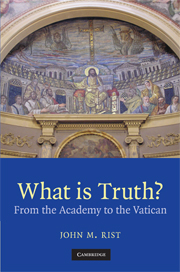Book contents
- Frontmatter
- Contents
- Acknowledgments
- Abbreviations
- Introduction: Partial and universal truth
- 1 The human race, or how could women be created in the image and likeness of God?
- 2 Divine justice and man's “genetic” flaw
- 3 Divine beauty: Nature, art and humanity
- 4 The origin and early development of episcopacy at Rome
- 5 Caesaropapism, theocracy or neo-Augustinian politics?
- 6 The Catholic Church in “modern” and “post-modern” culture
- 7 Looking at hopes and fears in the rear mirror
- Bibliography
- Index
Introduction: Partial and universal truth
Published online by Cambridge University Press: 05 June 2012
- Frontmatter
- Contents
- Acknowledgments
- Abbreviations
- Introduction: Partial and universal truth
- 1 The human race, or how could women be created in the image and likeness of God?
- 2 Divine justice and man's “genetic” flaw
- 3 Divine beauty: Nature, art and humanity
- 4 The origin and early development of episcopacy at Rome
- 5 Caesaropapism, theocracy or neo-Augustinian politics?
- 6 The Catholic Church in “modern” and “post-modern” culture
- 7 Looking at hopes and fears in the rear mirror
- Bibliography
- Index
Summary
Jesus and Paul did not belong to the Church of England.
K. Hopkins, A World Full of Gods (London 1999) 81TRUTH, SCRIPTURE AND CHRISTIAN CULTURE
“It is no less sure that both patristic and medieval theology recognized that the whole of saving truth is to be found in the Bible and that the Church is bound to its rule.” The words of a modern scholar echo those of Gregory of Nyssa in the fourth century: “We make the Scriptures the rule and the measure of every teaching.” Such comment may look obvious and self-explanatory, but it is not: neither as the complete expression of a theological principle since it leaves unanswered questions of interpretation – as, how literally is Scripture to be read?; nor in its implications, since “saving truth” needs to be identified and distinguished from other forms of truth; nor even as a fact about the history of the Church, for it leaves us uncertain about Christianity before the “Bible” – or more specifically the canon of the New Testament – was established, let alone what Christians were thinking and doing before the composition of the earliest New Testament texts (let us say before 55 ad, or some ten years later for the appearance of the earliest canonical Gospels). Some of the apostles, in the early days the ultimate court of appeal, were long-lived. By 120 they were all dead and the four-Gospel canon had not yet been established.
- Type
- Chapter
- Information
- What is Truth?From the Academy to the Vatican, pp. 1 - 17Publisher: Cambridge University PressPrint publication year: 2008

